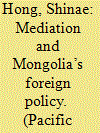| Srl | Item |
| 1 |
ID:
186608


|
|
|
|
|
| Summary/Abstract |
With its Ulaanbaatar Dialogues (UBD) initiatives, Mongolia has emerged as one of the most increasingly influential diplomatic powerhouses in northeast Asia, despite its small size. Moved by the mixed interests of garnering global influence and a small-state security strategy, the country has positioned itself as an honest neutral peace broker in the Korean conflict since 2013. Mongolia has demonstrated itself to be a successful third party in defusing tensions and, more crucially, jump-starting declining regional multilateral mechanisms for the Korean peace process. This study explores the undiscovered potential of small-state power. Mongolia shows how small states effectively increase their transnational appeal and expand their foreign policy reach through diplomatic mediation. This article examines the sources, strategies, and mechanisms of Mongolia’s mediation efforts, looking at the core features of Mongolian foreign policy and its diplomatic relations, and then focuses on the UBD initiatives – the country’s efforts as a third party to mediate the Korean Peninsula peace process. Thereby, this study contributes to the knowledge on the practice of international relations by reflecting on the burgeoning role of the Global South.
|
|
|
|
|
|
|
|
|
|
|
|
|
|
|
|
| 2 |
ID:
185991


|
|
|
|
|
| Summary/Abstract |
Over the past decade, the small state of Mongolia has emerged as an important player in Northeast Asia through its mediation efforts. Driven by a desire for regional and global influence and prestige, Mongolia has sought to locate itself as a neutral intermediary in regional conflicts—in particular the Korean peninsula’s peace process, by hosting the “Ulaanbaatar Dialogue” starting in 2013. In this regional security dialogue initiative, Mongolia has proven itself to be a capable peace broker in easing tensions between the two parties, and, more crucially, it has made a constructive impact on the regional security architecture by building a functioning multilateral dialogue mechanism to support the Korean peninsula peace process after the halt of the six-party talks. Its success has been aided by its perceived impartiality in the conflict; its multilateral, activist, peace-oriented foreign policy portfolio; and its cordial external relations with regional countries, including both North and South Korea, and globally. This article seeks to contribute to the understanding of the varied abilities, strategies, and sources of advantage employed by small states to project power and raise their influence in regional affairs by exploring the case of Mongolia.
|
|
|
|
|
|
|
|
|
|
|
|
|
|
|
|